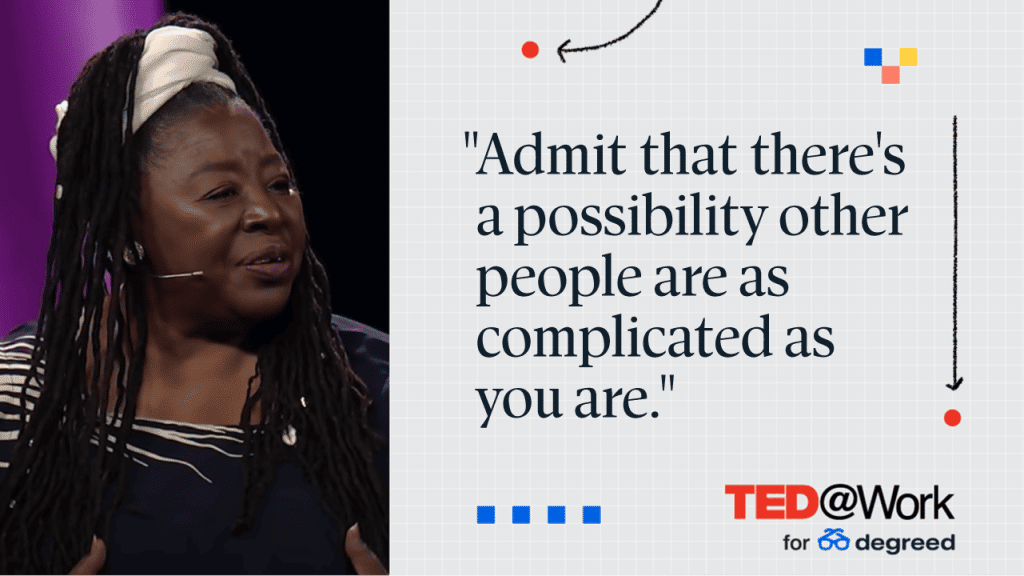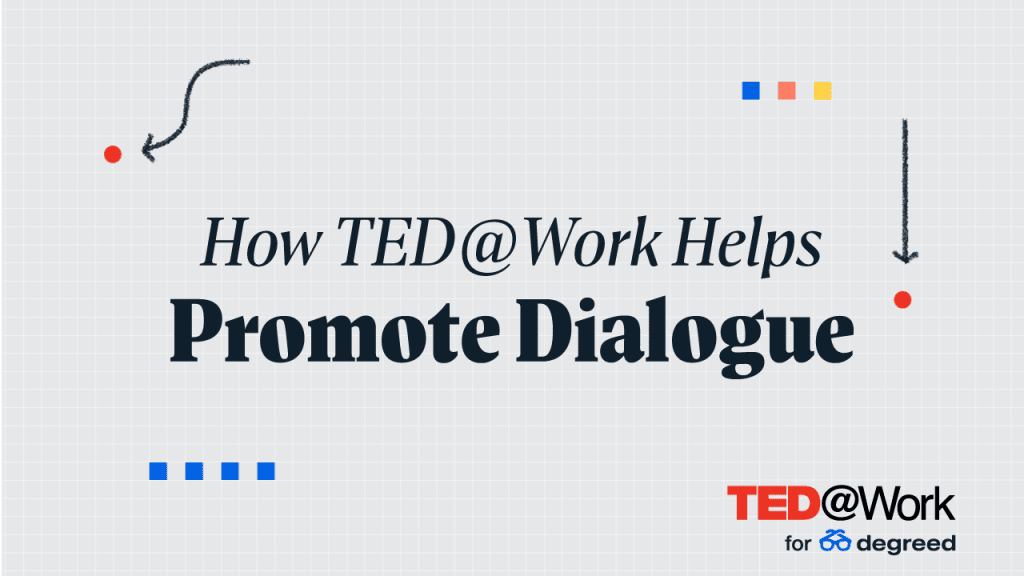Last year, more than 50 Degreed employees joined the RaceEQ Business Resource Group (BRG) for a workshop to view and discuss Mellody Hobson’s TED Talk “Color blind or color brave?” from TED@Work for Degreed, one of many One-Click Providers Degreed offers. In the second installment of our TED@Work workshop series, Degreed employees gathered to view and discuss Loretta J. Ross’ talk “Don’t call people out – call them in.”
This second workshop was led by an individual contributor who picked up the Discuss Anywhere Meeting-in-a-Box from TED@Work (all the resources she needed to prepare and host the session – including a PowerPoint deck and talking points – came with the toolkit). Thanks to the popularity of the first TED session on Mellody Hobson’s talk, this session drew more than 2x the number of participants.
In the first workshop, we learned that a lot of the invitees expressed apprehension at openly talking about race in the workplace. People who participated in that workshop discussed how they “feared negative repercussions if they said something unintentionally offensive or incorrect” at work. Others voiced concerns that they might be “seen by peers as not ‘woke’,” and preferred to avoid conversations about race altogether.
The idea of call-out culture, whether it happens publicly or behind closed doors, is to hold people accountable for their actions. However, by “shaming” these individuals and framing what they did as strictly “right or wrong,” we as a collective are essentially censoring opinions through the fear of being called out, or canceled, when we should be digging deeper.

Talking the Talk
The world we live in has shifted in many ways over the past few years, and cancel or call-out culture—the public shaming and blaming, on social media and in real life, of people who may have done wrong and are being held accountable—is a direct product of people feeling empowered to stand up for themselves, and oftentimes others. Calling people out has become the norm in an attempt to shed light on toxic behavior and take part in a collective movement to stop it.
Social movements like Black Lives Matter and #MeToo highlighted that while we have made great strides in educating those around us, holding people accountable and gaining allies, sometimes we need to remember to give those being targeted the space to speak for themselves. And what if we took that introspection even further, and really thought about the consequences of, as well as the motives behind, publicly calling people out for their behavior?
After establishing guidelines for a safe, constructive discussion and watching the talk together, the workshop participants broke out into small groups in separate rooms to discuss the concept of calling in.
Each group had breakout room facilitators who gently led the conversation, leveraging resources provided in the TED@Work Meeting-in-a-Box Pathway for this workshop. While each group’s discussions were different, participants noted leaving with a better understanding of how to have these difficult conversations, and of each other. Here are some takeaways from our recent TED@Work workshop:
1. Accept complexity.
In her TED Talk, Ross talks about her beginnings as an activist and how she made the shift to start inviting people in, rather than pushing them away. She defines “calling in” very simply: it’s a call-out, done with love. Rather than pointing fingers or drawing attention to behavior that we find offensive or borderline, which activates people’s defense mechanisms, calling in is an invitation to exchange in dialogue.
In a work environment, it is natural and normal to sometimes question your colleague’s behaviors. Imagine a coworker of yours says something you find to be generally offensive on a Zoom call. Rather than venting about it on a debrief call with another colleague and branding that person as a lost cause, why not call them in, or call on them, giving them a chance to clear the air?
Ross describes embracing this habit as “admitting that there is a possibility they [the person you are interacting with] are as complicated as you are,” and asking them probing questions so you can understand the root of their behavior. These can be as simple as “That’s an interesting viewpoint, tell me more.”
2. Recognize motives.
Ross recommends you think long and hard about your motives if you feel the urge to call someone out. While call-outs are generally an attempt at holding people accountable for their actions, they can come off as combative.
Calling on someone is a middle ground technique that starts with a neutral statement like “I beg your pardon,” and waiting while the person reflects on their actions. By asking such a simple question, you can find that the person will think through what they’ve just said and clarify their meaning.
3. Dig deeper.
Calling people in is not about eliminating accountability, but rather digging deeper into why people behave the way they do and calling on them to do better.
Publicly piling on someone who has done something we consider wrong only serves to shame them while calling them in offers opportunities to learn and grow for both parties.
Many misunderstandings in the workplace can be chalked up to simple miscommunication. This is especially true when in a remote-first company, as it is easy to miss out on visual and bodily cues when on virtual calls.
One of the biggest remote principles we are currently looking to implement across Degreed is to simply assume the best intentions in others, another concept that blurs the line of work and life, and ties directly back to what we heard during our TED@Work workshop
Walking the Walk
The RaceEQ BRG is one of many at Degreed and part of a wider string of DEIB initiatives of which we are incredibly proud. In addition to the TED@Work series, the group hosts numerous events around Black History Month, Juneteenth, the Lunar New Year, Hispanic Heritage Month, and Diwali to name just a few.
While educating people about racial equity is our main purpose, we also love when we can draw parallels with our everyday work lives. We are all human beings, capable of saying the wrong thing. Let’s make it a habit to call in and on each other and keep call-out culture out of the workplace.

Get in on the Action
TED@Work for Degreed includes 600+ TED Talks and TED-Ed animations supporting business-critical skills like team-building, managing stress, and inclusive leadership. All TED content is tagged against the Degreed skills taxonomy and built natively into Degreed. Plus, the handy resources built into each Pathway make organizing a large-scale discussion on hot topics easier than ever. Contact a Degreed representative today to learn how you can implement workshops like these with TED@Work for Degreed.
